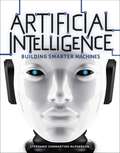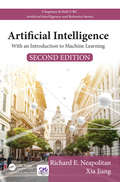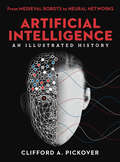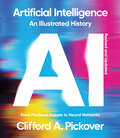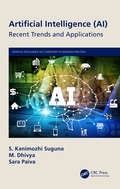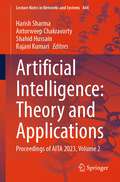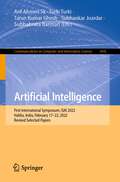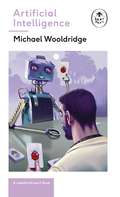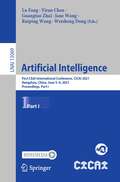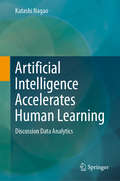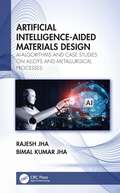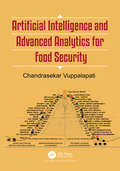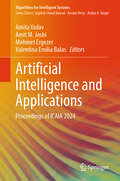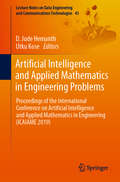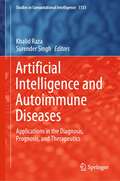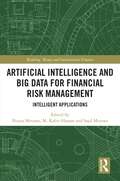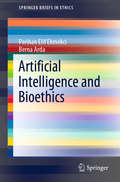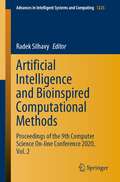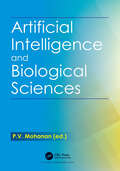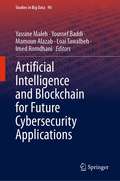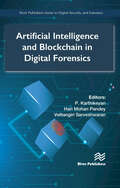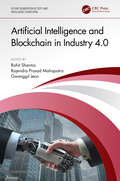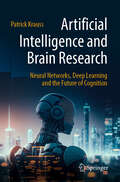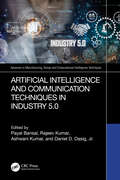- Table View
- List View
Artificial Intelligence: Building Smarter Machines
by Stephanie Sammartino McPhersonIn 2011 a computer named Watson outscored two human competitors on the TV quiz show Jeopardy! and snagged the million-dollar prize. Watson isn't the only machine keeping up with humans. The field of artificial intelligence (AI) is booming, with drones, robots, and computers handling tasks that once only humans could perform. Such advances raise challenging questions. Do Watson and other computers really think? Can machines acquire self-awareness? Is AI a promising or a dangerous technology? No machine, not even Watson, yet comes close to matching human intelligence, but many scientists believe it is only a matter of time before we reach this milestone. What will such a future look like?
Artificial Intelligence: With an Introduction to Machine Learning (Second Edition) (Chapman & Hall/CRC Artificial Intelligence and Robotics Series)
by Richard E. Neapolitan Xia JiangThe first edition of this popular textbook, Contemporary Artificial Intelligence, provided an accessible and student friendly introduction to AI. This fully revised and expanded update, Artificial Intelligence: With an Introduction to Machine Learning, Second Edition, retains the same accessibility and problem-solving approach, while providing new material and methods. The book is divided into five sections that focus on the most useful techniques that have emerged from AI. The first section of the book covers logic-based methods, while the second section focuses on probability-based methods. Emergent intelligence is featured in the third section and explores evolutionary computation and methods based on swarm intelligence. The newest section comes next and provides a detailed overview of neural networks and deep learning. The final section of the book focuses on natural language understanding. Suitable for undergraduate and beginning graduate students, this class-tested textbook provides students and other readers with key AI methods and algorithms for solving challenging problems involving systems that behave intelligently in specialized domains such as medical and software diagnostics, financial decision making, speech and text recognition, genetic analysis, and more.
Artificial Intelligence: From Medieval Robots to Neural Networks (Union Square & Co. Illustrated Histories)
by Clifford A. Pickover“This is an addictive stroll through the annals of artificial intelligence, highlighting almost 100 innovations developed between 1300 BCE and 2018” (Booklist).From medieval robots and Boolean algebra to facial recognition, artificial neural networks, and adversarial patches, this fascinating history takes readers on a lively tour through the world of artificial intelligence. Award–winning author Clifford A. Pickover (The Math Book, The Physics Book, Death & the Afterlife) explores the historic and current applications of AI in such diverse fields as computing, medicine, popular culture, mythology, and philosophy, and considers the enduring threat to humanity should AI grow out of control. Across 100 illustrated entries, Pickover provides an entertaining and informative look into when artificial intelligence began, how it developed, where it’s going, and what it means for the future of human-machine interaction.“An enjoyable diversion to read cover to cover, follow along common strands, or dip into for random bits.” —Booklist
Artificial Intelligence: From Medieval Robots to Neural Networks (Union Square & Co. Illustrated Histories)
by Clifford A. PickoverA History of the Future that's Happening Right NowArtificial Intelligence: An Illustrated History explores the historic origins and current applications of AI in such diverse fields as computing, medicine, popular culture, mythology, and philosophy. Through more than 100 entries, award-winning author Clifford A. Pickover, offers a granular, yet accessible, glimpse into the world of AI—from medieval robots and Boolean algebra to facial recognition, and artificial neural networks. First released in 2019, this updated paperback edition brings readers up to speed with coverage of technologies such as DALL-E and ChatGPT, and it explores the very real fear that AI will alter the course of humanity—forever.
Artificial Intelligence: Recent Trends and Applications (Artificial Intelligence (AI): Elementary to Advanced Practices)
by S. Kanimozhi Suguna, M. Dhivya, and Sara PaivaThis book aims to bring together leading academic scientists, researchers, and research scholars to exchange and share their experiences and research results on all aspects of Artificial Intelligence. The book provides a premier interdisciplinary platform to present practical challenges and adopted solutions. The book addresses the complete functional framework workflow in Artificial Intelligence technology. It explores the basic and high-level concepts and can serve as a manual for the industry for beginners and the more advanced. It covers intelligent and automated systems and its implications to the real-world, and offers data acquisition and case studies related to data-intensive technologies in AI-based applications. The book will be of interest to researchers, professionals, scientists, professors, students of computer science engineering, electronics and communications, as well as information technology.
Artificial Intelligence: Proceedings of AITA 2023, Volume 2 (Lecture Notes in Networks and Systems #844)
by Harish Sharma Antorweep Chakravorty Shahid Hussain Rajani KumariThis book features a collection of high-quality research papers presented at International Conference on Artificial Intelligence: Theory and Applications (AITA 2023), held during 11–12 August 2023 in Bengaluru, India. The book is divided into two volumes and presents original research and review papers related to artificial intelligence and its applications in various domains including health care, finance, transportation, education, and many more.
Artificial Intelligence: First International Symposium, ISAI 2022, Haldia, India, February 17-22, 2022, Revised Selected Papers (Communications in Computer and Information Science #1695)
by Arif Ahmed Sk Turki Turki Tarun Kumar Ghosh Subhankar Joardar Subhabrata BarmanThis book constitutes the refereed proceedings of the First International Symposium on Artificial Intelligence, ISAI 2022, held in Haldia, India, during February 17-22, 2022. The 30 full papers included in this book were carefully reviewed and selected from 75 submissions. They were organized in topical sections as follows: information systems, mathematics and data analyses; and applied artificial intelligence..
Artificial Intelligence: Everything you need to know about the coming AI. A Ladybird Expert Book (The Ladybird Expert Series #27)
by Michael Wooldridge'I propose to consider the question, 'Can machines think?' Alan Turing (1950)Part of the ALL-NEW Ladybird Expert series.This book is for everyone living in the age of Artificial Intelligence. And this is an accessible and authoritative introduction to one of the most important conversations of our time . . . Written by computer scientist Michael Wooldridge, Artificial Intelligence chronicles the development of intelligent machines, from Turing's dream of machines that think, to today's digital assistants like Siri and Alexa. AI is not something that awaits us in the future. Inside you'll learn how we have come to rely on embedded AI software and what a world of ubiquitous AI might look like.What's inside?- The British mathematician Alan Turing- Can machines 'understand'?- Logical and Behavioural AI- The reality of AI today- AI tomorrow- And much more . . . For an adult readership, the Ladybird Expert series is produced in the same iconic small hardback format pioneered by the original Ladybirds. Each beautifully illustrated book features the first new illustrations produced in the original Ladybird style for nearly forty years.
Artificial Intelligence: First CAAI International Conference, CICAI 2021, Hangzhou, China, June 5–6, 2021, Proceedings, Part I (Lecture Notes in Computer Science #13069)
by Guangtao Zhai Jane Wang Yiran Chen Lu Fang Ruiping Wang Weisheng DongThis two-volume set LNCS 13069-13070 constitutes selected papers presented at the First CAAI International Conference on Artificial Intelligence, held in Hangzhou, China, in June 2021. Due to the COVID-19 pandemic the conference was partially held online. The 105 papers were thoroughly reviewed and selected from 307 qualified submissions. The papers are organized in topical sections on applications of AI; computer vision; data mining; explainability, understandability, and verifiability of AI; machine learning; natural language processing; robotics; and other AI related topics.
Artificial Intelligence Accelerates Human Learning: Discussion Data Analytics
by Katashi NagaoFocusing on students’ presentations and discussions in laboratory seminars, this book presents case studies on evidence-based education using artificial intelligence (AI) technologies. It proposes a system to help users complete research activities, and a machine-learning method that makes the system suitable for long-term operation by performing data mining for discussions and automatically extracting essential tasks. By illustrating the complete process – proposal, implementation, and operation – of applying machine learning techniques to real-world situations, the book will inspire researchers and professionals to develop innovative new applications for education. The book is divided into six chapters, the first of which provides an overview of AI research and practice in education. In turn, Chapter 2 describes a mechanism for applying data analytics to student discussions and utilizing the results for knowledge creation activities such as research. Based on discussion data analytics, Chapter 3 describes a creative activity support system that effectively utilizes the analytical results of the discussion for subsequent activities. Chapter 4 discusses the incorporation of a gamification method to evaluate and improve discussion skills while maintaining the motivation to participate in the discussion. Chapters 5 and 6 describe an advanced learning environment for honing students’ discussion and presentation skills. Two important systems proposed here are a presentation training system using virtual reality technologies, and an interactive presentation/discussion training system using a humanoid robot. In the former, the virtual space is constructed by measuring the three-dimensional shape of the actual auditorium, presentations are performed in the same way as in the real world, and the AI as audience automatically evaluates the presentation and provides feedback. In the latter, a humanoid robot makes some remarks on and asks questions about students’ presentations, and the students practice responding to it.
Artificial Intelligence-Aided Materials Design: AI-Algorithms and Case Studies on Alloys and Metallurgical Processes
by Rajesh Jha Bimal Kumar JhaThis book describes the application of artificial intelligence (AI)/machine learning (ML) concepts to develop predictive models that can be used to design alloy materials, including hard and soft magnetic alloys, nickel-base superalloys, titanium-base alloys, and aluminum-base alloys. Readers new to AI/ML algorithms can use this book as a starting point and use the MATLAB® and Python implementation of AI/ML algorithms through included case studies. Experienced AI/ML researchers who want to try new algorithms can use this book and study the case studies for reference. Offers advantages and limitations of several AI concepts and their proper implementation in various data types generated through experiments and computer simulations and from industries in different file formats Helps readers to develop predictive models through AI/ML algorithms by writing their own computer code or using resources where they do not have to write code Covers downloadable resources such as MATLAB GUI/APP and Python implementation that can be used on common mobile devices Discusses the CALPHAD approach and ways to use data generated from it Features a chapter on metallurgical/materials concepts to help readers understand the case studies and thus proper implementation of AI/ML algorithms under the framework of data-driven materials science Uses case studies to examine the importance of using unsupervised machine learning algorithms in determining patterns in datasets This book is written for materials scientists and metallurgists interested in the application of AI, ML, and data science in the development of new materials.
Artificial Intelligence Algorithm Design for Systems: Proceedings of 13th Computer Science Online Conference 2024, Volume 3 (Lecture Notes in Networks and Systems #1120)
by Radek Silhavy Petr SilhavyThis volume delves into the application of Artificial Intelligence within systems and network environments. Highlighted papers investigate the latest in neural network applications, optimisation strategies, and hybrid bio-inspired algorithms. It includes the rigorously reviewed proceedings of the Artificial Intelligence Application in Networks and Systems session of the 13th Computer Science Online Conference 2024 (CSOC 2024), held online in April 2024.
Artificial Intelligence and Advanced Analytics for Food Security
by Chandrasekar VuppalapatiClimate change, increasing population, food-versus-fuel economics, pandemics, etc. pose a threat to food security to unprecedented levels. It has fallen upon the practitioners of agriculture and technologists of the world to innovate and become more productive to address the multi-pronged food security challenges. Agricultural innovation is key to managing food security concerns. The infusion of data science, artificial intelligence (AI), advanced analytics, satellites data, geospatial data, climatology, sensor technologies, and climate modeling with traditional agricultural practices such as soil engineering, fertilizers use, and agronomy are some of the best ways to achieve this. Data science helps farmers to unravel patterns in fertilizer pricing, equipment usage, transportation and storage costs, yield per hectare, and weather trends to better plan and spend resources. AI enables farmers to learn from fellow farmers to apply best techniques that are transferred learning from AI to improve agricultural productivity and to achieve financial sustainability. Sensor technologies play an important role in getting real-time farm field data and provide feedback loops to improve overall agricultural practices and can yield huge productivity gains. Advanced Analytics modeling is essential software technique that codifies farmers’ tacit knowledge such as better seed per soil, better feed for dairy cattle breed, or production practices to match weather pattern that was acquired over years of their hard work to share with worldwide farmers to improve overall production efficiencies, the best antidote to food security issue. In addition to the paradigm shift, economic sustainability of small farms is a major enabler of food security. The book reviews all these technological advances and proposes macroeconomic pricing models that data mines macroeconomic signals and the influence of global economic trends on small farm sustainability to provide actionable insights to farmers to avert any financial disasters due to recurrent economic crises.
Artificial Intelligence and Applications: Proceedings of ICAIA 2024 (Algorithms for Intelligent Systems)
by Amita Yadav Amit M. Joshi Mehmet Ergezer Valentina Emilia BalasThe papers in this book are high quality refereed papers presented at ICAIA 2024, the second International conference on Artificial Intelligence and Applications, held at Maharaja Surajmal Institute of Technology, New Delhi in collaboration with Wentworth Institute of Technology, Boston, USA in March 2024. This book presents new and innovative developments and applications in machine learning, data mining, neural networks, computation optimisation technologies, followed by research applications in signals, language and classification, prediction, recommendations, and systems. This book is essential for researchers and practitioners in this field.
Artificial Intelligence and Applied Mathematics in Engineering Problems: Proceedings of the International Conference on Artificial Intelligence and Applied Mathematics in Engineering (ICAIAME 2019) (Lecture Notes on Data Engineering and Communications Technologies #43)
by D. Jude Hemanth Utku KoseThis book features research presented at the 1st International Conference on Artificial Intelligence and Applied Mathematics in Engineering, held on 20–22 April 2019 at Antalya, Manavgat (Turkey). In today’s world, various engineering areas are essential components of technological innovations and effective real-world solutions for a better future. In this context, the book focuses on problems in engineering and discusses research using artificial intelligence and applied mathematics. Intended for scientists, experts, M.Sc. and Ph.D. students, postdocs and anyone interested in the subjects covered, the book can also be used as a reference resource for courses related to artificial intelligence and applied mathematics.
Artificial Intelligence and Autoimmune Diseases: Applications in the Diagnosis, Prognosis, and Therapeutics (Studies in Computational Intelligence #1133)
by Khalid Raza Surender SinghThe book provides an overview of various autoimmune disorders and how artificial intelligence (AI) and machine learning will be used for the diagnosis, prognosis, and treatment of these disorders. AI algorithms are used to create synthetic patient populations with the properties of actual patient cohorts, build personalized predictive models of drug combinations and unravel complex relationships between diet, microbiome, and genetic line-up to determine the comparative treatment response. The book highlights clinical applications and challenges of AI for the diagnosis and treatment/management of autoimmune disorders which includes Rheumatoid Arthritis (RA), Multiple Sclerosis (MS), Type I Diabetes, Psoriatic Arthritis (PsA), and other critical diseases.
Artificial Intelligence and Big Data for Financial Risk Management: Intelligent Applications (Banking, Money and International Finance)
by Hassan M. Kabir Metawa Saad Metawa NouraThis book presents a collection of high-quality contributions on the state-of-the-art in Artificial Intelligence and Big Data analysis as it relates to financial risk management applications. It brings together, in one place, the latest thinking on an emerging topic and includes principles, reviews, examples, and research directions. The book presents numerous specific use-cases throughout, showing practical applications of the concepts discussed. It looks at technologies such as eye movement analysis, data mining or mobile apps and examines how these technologies are applied by financial institutions, and how this affects both the institutions and the market. This work introduces students and aspiring practitioners to the subject of risk management in a structured manner. It is primarily aimed at researchers and students in finance and intelligent big data applications, such as intelligent information systems, smart economics and finance applications, and the internet of things in a marketing environment.
Artificial Intelligence and Bioethics (SpringerBriefs in Ethics)
by Perihan Elif Ekmekci Berna ArdaThis book explores major bioethical issues emerging from the development and use of artificial intelligence in medical settings. The authors start by defining the past, present and future of artificial intelligence in medical settings and then proceed to address the resulting common and specific bioethical inquiries. The book discusses bioethical inquiries in two separate sets. The first set is comprised of ontological discussions mainly focusing on personhood and being an ethical agent of an artefact. The second set discusses bioethical issues resulting from the use of artificial intelligence. It focuses particularly on the area of artificial intelligence use in medicine and health services. It addresses the main challenges by considering fundamental principles of medical ethics, including confidentiality, privacy, compassion, veracity and fidelity. Finally, the authors discuss the ethical implications of involvement of artificial intelligence agents in patient care by expanding on communication skills in a case-based approach. The book is of great interest to ethicists, medical professionals, academicians, engineers and scientists working with artificial intelligence.
Artificial Intelligence and Bioinspired Computational Methods: Proceedings of the 9th Computer Science On-line Conference 2020, Vol. 2 (Advances in Intelligent Systems and Computing #1225)
by Radek SilhavyThis book gathers the refereed proceedings of the Artificial Intelligence and Bioinspired Computational Methods Section of the 9th Computer Science On-line Conference 2020 (CSOC 2020), held on-line in April 2020.Artificial intelligence and bioinspired computational methods now represent crucial areas of computer science research. The topics presented here reflect the current discussion on cutting-edge hybrid and bioinspired algorithms and their applications.
Artificial Intelligence and Biological Sciences
by P. V. MohananAdvancements of AI in medical and biological sciences have opened new ways for drug development. Novel therapeutic molecules and their target action can be easily predicted and can be modified. AI helps in disease detection and diagnosis faster. The breakthrough of AI is made especially in the area of personalized precision medicine, host-pathogen interaction and predictive epidemiology. These approaches could help in faster decision-making with minimal errors that can improve risk analysis, especially disease diagnosis and selecting treatment strategy. In agricultural practices, an exact combination of fertilizers, pesticides, herbicides, soil management, water requirement analysis, yield prediction and overall crop management can be modified by implementing AI interventions. AI could provide a better improvement in agriculture, medical research, pharmaceuticals and bio-based industries for a sustainable life.The key features of this book are: AI in medical Sciences, biotechnology and drug discovery; Application of AI in Digital Pathology, cytology and bioinformatics; Overview of AI, Machine Learning and Deep Learning; Impact of Artificial Intelligence in Society; Artificial Intelligence in Pharmacovigilance; and Ethics in Artificial Intelligence. The volume aims to comprehensively cover the application of AI in biological sciences. It is a collection of contributions from different authors who have several years of experience in their specific areas. The book will be useful for pharma companies, CROs, product developers, students, researchers, academicians, policymakers and practitioners.
Artificial Intelligence and Blockchain for Future Cybersecurity Applications (Studies in Big Data #90)
by Yassine Maleh Youssef Baddi Mamoun Alazab Loai Tawalbeh Imed RomdhaniThis book presents state-of-the-art research on artificial intelligence and blockchain for future cybersecurity applications. The accepted book chapters covered many themes, including artificial intelligence and blockchain challenges, models and applications, cyber threats and intrusions analysis and detection, and many other applications for smart cyber ecosystems. It aspires to provide a relevant reference for students, researchers, engineers, and professionals working in this particular area or those interested in grasping its diverse facets and exploring the latest advances on artificial intelligence and blockchain for future cybersecurity applications.
Artificial Intelligence and Blockchain in Digital Forensics (River Publishers Series in Digital Security and Forensics)
by P. Karthikeyan Hari Mohan Pandey Velliangiri SarveshwaranDigital forensics is the science of detecting evidence from digital media like a computer, smartphone, server, or network. It provides the forensic team with the most beneficial methods to solve confused digital-related cases. AI and blockchain can be applied to solve online predatory chat cases and photo forensics cases, provide network service evidence, custody of digital files in forensic medicine, and identify roots of data scavenging. The increased use of PCs and extensive use of internet access, have meant easy availability of hacking tools. Over the past two decades, improvements in the information technology landscape have made the collection, preservation, and analysis of digital evidence extremely important. The traditional tools for solving cybercrimes and preparing court cases are making investigations difficult. We can use AI and blockchain design frameworks to make the digital forensic process efficient and straightforward. AI features help determine the contents of a picture, detect spam email messages and recognize swatches of hard drives that could contain suspicious files. Blockchain-based lawful evidence management schemes can supervise the entire evidence flow of all of the court data. This book provides a wide-ranging overview of how AI and blockchain can be used to solve problems in digital forensics using advanced tools and applications available on the market.
Artificial Intelligence and Blockchain in Industry 4.0 (Future Generation of Soft and Intelligent Computing)
by Rohit Sharma Rajendra Prasad Mahapatra Gwanggil JeonThe book addresses the challenges in designing blockchain-based secured solutions for Industry 4.0 applications using artificial intelligence. It further provides a comparative analysis of various advanced security approaches such as edge computing, cybersecurity, and cloud computing in the realm of information technology. This book: • Address the challenges in designing blockchain-based secured solutions for Industry 4.0 applications using artificial intelligence • Provides a comparative analysis of various advanced security approaches such as edge computing, cybersecurity, and cloud computing in the realm of information technology • Discusses the evolution of blockchain and artificial intelligence technology, from fundamental theories to practical aspects • Illustrates the most recent research solutions that handle the security and privacy threats while considering the resource-constrained in Industry 4.0 devices • Showcases the methods and tools necessary for intelligent data analysis and gives solutions to problems resulting from automated data collection The text aims to fill the gap between the theories of blockchain and its practical application in business, government, and defense among other areas. It further highlights the challenges associated with the use of blockchain for various industry 4.0 applications such as data analytics, software-defined networks, cyber-physical systems, drones, and cybersecurity. The text is primarily written for senior undergraduate, graduate students, and academic researchers in the fields of electrical engineering, electronics and communication engineering, computer engineering, manufacturing engineering, and industrial engineering.
Artificial Intelligence and Brain Research: Neural Networks, Deep Learning and the Future of Cognition
by Patrick KraussHow does artificial intelligence (AI) work and are there parallels to the human brain? What do natural and artificial intelligence have in common, and what are the differences? Is the brain nothing more than a biological computer? What are neural networks and how can the term deep learning be explained simply?Since the cognitive revolution in the middle of the last century, AI and brain research have been closely intertwined. There have been several spectacular breakthroughs in the field of AI in recent years, from alphaGo to DALL-E 2 and ChatGPT, which were completely unthinkable until recently. However, researchers are already working on the innovations of tomorrow, such as hybrid machine learning or neuro-symbolic AI. But what does this actually mean?Based on current research findings and exciting practical examples, this non-fiction book provides an understandable introduction to the basics and challenges of these fascinating disciplines. You will learn what neuroscience and psychology know about how the brain works and how artificial intelligence works. You will also learn how AI has revolutionized our understanding of the brain and how findings from brain research are used in computer science to further develop AI algorithms. Discover the fascinating world of these two disciplines. Find out why artificial intelligence and brain research are two sides of the same coin and how they will shape our future.
Artificial Intelligence and Communication Techniques in Industry 5.0 (Advances in Manufacturing, Design and Computational Intelligence Techniques)
by Payal Bansal Rajeev Kumar Ashwani Kumar Daniel D. DasigThe book highlights the role of artificial intelligence in driving innovation, productivity, and efficiency. It further covers applications of artificial intelligence for digital marketing in Industry 5.0 and discusses data security and privacy issues in artificial intelligence, risk assessments, and identification strategies.This book: Discusses the role of artificial intelligence applications for digital manufacturing in Industry 5.0 Presents blockchain methods and data-driven decision-making with autonomous transportation Covers reinforcement learning algorithm and highly predicted models for accurate data analysis in industry automation Highlights the importance of robust authentication mechanisms and access control policies to protect sensitive information, prevent unauthorized access, and enable secure interactions between humans and machines Explains attack pattern detection and prediction which play a crucial role in ensuring the security of business systems and networks It is primarily written for senior undergraduates, graduate students, and academic researchers in the fields of electrical engineering, electronics and communication engineering, computer engineering, industrial engineering, manufacturing engineering, and production engineering.
